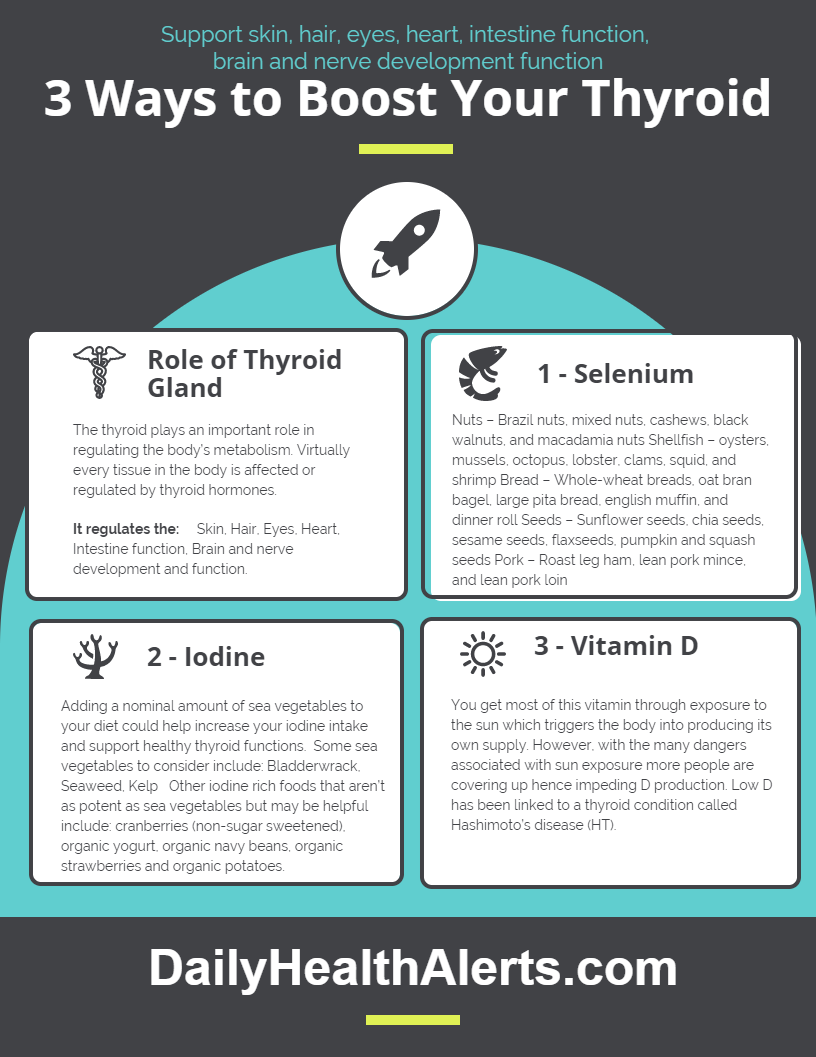The thyroid gland acts as your body’s control center. Its constant release or withholding of various hormones signals the body to carry out specific functions. Located below the Adam’s Apple (aka the laryngeal prominence), the butterfly shaped thyroid gland is one of the largest organs of the endocrine system. The hormones secreted from this gland affect almost every cell in the body and it has been shown that you can eat foods that boost your thyroid hormones.
According to Johns Hopkins Medicine,
“The thyroid plays an important role in regulating the body’s metabolism. Virtually every tissue in the body is affected or regulated by thyroid hormones. It regulates the:
The thyroid hormones enter into tissues and regulate how those tissues produce or do not produce certain proteins. The thyroid function is controlled by the pituitary, which sits at the base of the brain. The pituitary is controlled by a region in the brain called the hypothalamus.”
When the thyroid is thrown off balance you could develop various conditions including hypothyroidism, when the gland doesn’t produce enough hormones or hyperthyroidism, when the gland produces too many hormones. Each of these conditions is associated with a laundry list of symptoms.
You can choose foods that boost your thyroid health. Know these thyroid boosting foods to keep your body controller working optimally.
Selenium
The liver, kidneys and thyroid gland contain the most selenium of any organs in the body. Selenium is a mineral derived from the soil. There are many foods that contain this mineral and studies have shown that eating these foods could enhance your thyroid health.
A study by Chinese researchers, ‘Low Population Selenium Status Is Associated With Increased Prevalence of Thyroid Disease,’ published in The Journal of Clinical Endocrinology & Metabolis (Volume 100, Issue 11, 1 November 2015, Pages 4037–4047) concluded that,
“Low selenium status is associated with increased risk of thyroid disease. Increased selenium intake may reduce the risk in areas of low selenium intake that exist not only in China but also in many other parts of the world.”
Eat more selenium rich foods for your thyroid health which include,

Iodine
Your thyroid needs iodine, a trace mineral found in some foods or added to others. This mineral is essential for thyroid function and without it could cause an imbalance that may lead to developing a goiter (swelling of the thyroid) or even thyroid cancer.
It is important to consume enough iodine as well as making sure you’re not getting too much. A study published in the Annals of Pediatric Endocrinology & Metabolism concluded that,
“Both iodine deficiency and iodine excess are associated with an increased risk of thyroid disorders.”
Adding a nominal amount of sea vegetables to your diet could help increase your iodine intake and support healthy thyroid functions. If obtaining sea vegetables to cook with is difficult, talk to your doctor about sea vegetable or iodine supplements which can work just as well.
Some sea vegetables to consider include:
Other iodine rich foods that aren’t as potent as sea vegetables but may be helpful include: cranberries (non-sugar sweetened), organic yogurt, organic navy beans, organic strawberries and organic potatoes.
Vitamin D
You have most likely heard that vitamin D deficiency is more prominent than ever. You get most of this vitamin through exposure to the sun which triggers the body into producing its own supply. However, with the many dangers associated with sun exposure more people are covering up hence impeding D production. Low D has been linked to a thyroid condition called Hashimoto’s disease (HT).
A study in the journal Thyroid (Volume: 21 Issue 8: August 2, 2011) confirmed this concluding,
“The prevalence of vitamin D insufficiency in HT cases (148 of 161, 92%) was significantly higher than that observed in healthy controls…Vitamin D insufficiency is associated with HT.”
Keeping your thyroid running on all cylinders is essential to your overall, systemic health. By choosing foods that boost your thyroid, you just may be able to avoid conventional medicine for your thyroid or related thyroid symptoms.